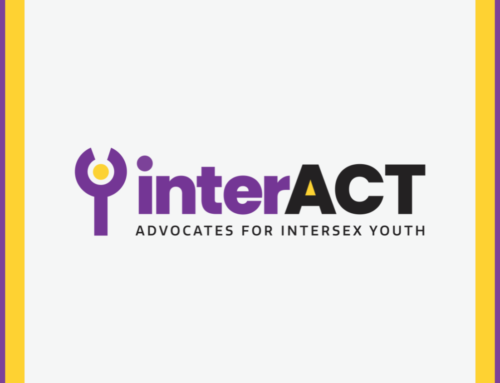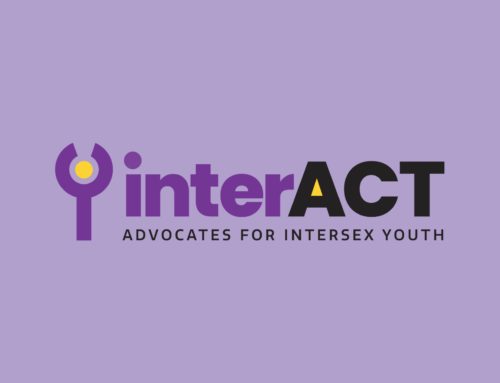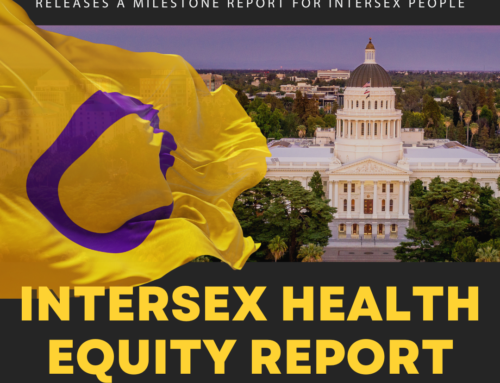
From Anne Tamar-Mattis, interACT Founder and Legal Director
To all of my friends, colleagues, and fellow activists, I have a bittersweet announcement to make. As of September 15, I am moving on from my position as Legal Director of interACT. It has been an honor and privilege to be able to work in service to this incredible community, and I will miss this organization terribly. But after 11 years, it is time for me to explore other areas of work, and to attend to the needs of my family.
I am proud to be able to say that interACT is as strong as it’s ever been. Our Executive Director, Kimberly Zieselman, has been leading the organization for the last two years, during which time we have seen amazing growth and unprecedented media coverage. She has proven herself to be a powerful voice for the most vulnerable members of our community, who cannot speak for themselves. Our Deputy Legal Director, Alesdair Ittelson, has been essentially running the law and policy program for the last nine months while I wrapped up my two final projects, our recent litigation and our joint report with Human Rights Watch. Al will be stepping into my shoes as Director of Law & Policy. He and our Staff Attorney, Sylvan Fraser, are both brilliant attorneys who have been working with interACT for years. Our Youth Coordinator, Emily Quinn, is rallying an incredible group of empowered young intersex people who are raising their voices and taking action in their communities like never before. Together with the rest of the interACT team, I know they will continue to propel our work forward to ensure that all intersex children’s rights are protected.

As I pass the baton to them, I have a few parting thoughts.
The first is for my colleagues in this work — the activists fighting for change, the volunteers building supportive communities, the academics who amplify the community’s message, and the health care providers who are working to end medical harm to intersex children. This is heart-wrenchingly painful work. Please remember to take care of yourself. Your burnout benefits no one. We need leaders with experience, and that means we need leaders who know when it is time to take a break, find some support, or do something healing for yourself so that you can last long enough to develop and then share your skills.
The second thought is for the community as a whole. As a non-intersex ally, I have always been hesitant to tell anyone else in the movement what I thought they “should” do to further the cause. It is intersex people who should be leading the movement and determining strategy. But I have also been in a position to see, over the years, how many intersex leaders are burned out, beaten down, and even chased out of activism as a result of the harsh criticism that can come from within this movement. Of course, a community’s leaders must be open to critique from the community. At the same time, it is important to be aware that once a person has been brave enough to find an intersex community, stepping forward publicly to help others (even while still dealing with their own history of stigma and medical abuse), is an act of incredible courage. Criticism from within one’s own community has a special sting at that moment. I hope that everyone can remember this, even as they hold each other accountable. I hope you will make the effort to show each other appreciation as often as you can, especially when someone has taken a risk. As my wise friend, Niki Khanna once said: “Sometimes our sharp, pointy bits hit someone else’s soft, tender bits as we bounce around in this world together. Please remember to be kind to one another. We are in this together.”

Even as we remember to be kind to one another, and gentle with ourselves and each other, it’s important to recognize that there are some difficult conversations ahead. The intersex community does not exist in a bubble separate from the struggles of the larger community, and this movement’s vision of human rights for all intersex people will not be complete without addressing the realities of race, class, ability, gender, and sexuality within the community. It’s vital to follow the leadership of people of color, working class people, disabled people, and queer people from the community in meeting this challenge, and to respect the risk they take when they step forward to lead in this way.
Finally, I have something to say to those in the medical community who treat these vulnerable children. I know that many of you now believe that performing non-consensual genital surgery on infants is not the best way to help them. I know that even more have doubts about the surgical paradigm, and are uncomfortable with the ways parents are sometimes bullied, pressured, or misled into approving unnecessary surgery. And I know that many of you are afraid to speak up about your concerns when it matters the most. We are in a moment of history (in the intersex movement and in the larger world) where it is becoming increasingly plain that our character and our legacy will be defined by our willingness to stand up to injustice. It is not enough to have good intentions. It is not enough even to do right by your own patients. It is clear which way the winds of history are blowing, and those of you who remain silent now will someday look back on your actions (or lack of action) with regret.

I am excited to see what comes next, for myself, for interACT, and for the intersex movement. I am grateful for the trust many in the community put in me over the years, and for your continuing support of interACT. This movement has accomplished astonishing things together, and more victories are just around the corner.
With hope and gratitude,
![]()
Anne Tamar-Mattis
Message from Executive Director, Kimberly Zieselman:
interACT is so grateful to Anne for her years of visionary leadership and commitment to intersex rights. We have had many recent successes and yet there is still so much more work to be done. Show your appreciation and gratitude for Anne by making a gift to interACT in her honor!





